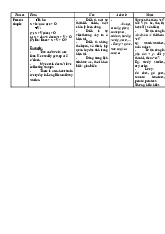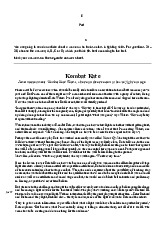



















Preview text:
lOMoAR cPSD| 59085392 28/03/2022 lOMoAR cPSD| 59085392 28/03/2022
In evaluating any argument, one should always ask
Conclusion: Therefore, you will score perfectly on the . lOMoAR cPSD| 59085392 28/03/2022 Example, 2
Even though premises 1 and 2 are false, they still
provide good reasons to accept the conclusion. Why?
• Because, if they were true, the conclusion would have to be true
• If a green cheese moon really did ensure that you ace the next
exam, and it really was green cheese, then you really would ace the next exam
• So, you will never be able to show that premises don’t
provide “good reasons” for a conclusion by pointing out that they are false
• Save “truth evaluation” for chapter 8 3-4
with rigorous, inescapable logic All humans are mortal
Therefore, Socrates is mortal . lOMoAR cPSD| 59085392 28/03/2022
conclusions are plausible or likely given the premises Misconception . lOMoAR cPSD| 59085392 28/03/2022
Deduction: All males are mortal. (general premise) I am a
male. Therefore, I am mortal. (particular conclusion)
Inductive: The last two winter days were cold. (particular
Deduction and Induction: Avoid a Misconception, 3
But arguments can be presented in this manner as well: •
Deductive: Lincoln was president from 1861 to 1865.
(particular premise) Therefore, all persons born during
Lincoln’s presidency were born in the nineteenth century. (general conclusion) •
Inductive: I have got A’s in all my classes so far. (general
premise) Therefore, I will get an A in this class. (particular conclusion)
© 2019 McGraw-Hill Companies. All Rights Reserved. 3-9 lOMoAR cPSD| 59085392 28/03/2022
Differences between Deductive and Inductive Arguments, 1
Deductive arguments claim that: Inductive arguments claim that: •
If the premises are true, then the • If the premises are true, then the
conclusion must be true conclusion is probably true •
The conclusion follows necessarily • The conclusion follows probably from
the premises from the premises •
It is impossible for all the premises •
It is unlikely for the premises
to be to be true and the conclusion false true and the conclusion false •
It is logically inconsistent to assert • Although it is logically
consistent to the premises and deny the assert the premises and deny the conclusion conclusion, the conclusion is
probably true if the premises are true
© 2019 McGraw-Hill Companies. All Rights Reserved. 3-11 lOMoAR cPSD| 59085392 28/03/2022 Tests to Determine Whether an
Argument Is Deductive or Inductive, 1 Indicator word test •
Indicator words can be used to communicate when an
argument is deductive or inductive •
Examples of deduction indicator words: Certainly,
definitely, this entails that, and conclusively •
Examples of induction indicator words: Probably, likely,
one would expect that, odds are that, and it is reasonable to assume that •
Indicator words are not always present, and they are
sometimes used loosely or improperly •
For example, a speaker may say “it certainly follows” but
be exaggerating, knowing that it only “probably follows” 3-12
Tests to Determine Whether an Argument Is Deductive or Inductive, 2 Strict necessity test •
An argument’s conclusion either follows with strict logical
necessity from its premises or it does not •
If it does, the argument should always be treated as deductive •
If it doesn’t, the argument should be treated as inductive • Examples •
Alan is a father. Therefore, Alan is a male. (deductive) •
Jill is a six-year-old girl. Therefore, Jill cannot run a mile in one minute flat. (inductive)
© 2019 McGraw-Hill Companies. All Rights Reserved. 3-13 lOMoAR cPSD| 59085392 28/03/2022
Tests to Determine Whether an Argument Is Deductive or Inductive, 3 •
Exceptions to the strict necessity test: An argument in which the conclusion
does not follow necessarily from the premises should nonetheless be treated
as deductive in the following situations: •
Language/ context makes clear that the arguer intended to offer a logically
conclusive argument, but the argument, in fact, is not logically conclusive
Magellan's ships sailed around the world. It necessarily follows, therefore, that the earth is a sphere. •
Argument has a pattern of reasoning that is characteristically deductive, and
nothing else about the argument clearly indicates that the argument is meant to be inductive
If I am in Wilkes-Barre, then I'm in P A. I am not in Wilkes-Barre.
Therefore, I am not in Pennsylvania.
If I’m Bill Gates, then I’m mortal. I’m not Bill Gates. Therefore, I’m not mortal. 3-14 . lOMoAR cPSD| 59085392 28/03/2022
Tests to Determine Whether an Argument Is Deductive or Inductive, 6 Principle of charity test •
When interpreting an unclear argument or passage,
always give the speaker or writer the benefit of the doubt •
Never attribute to an arguer a weaker argument when the
evidence reasonably permits us to attribute to him or her a stronger one •
Never interpret a passage as a bad argument when the
evidence reasonably permits us to interpret it as not an argument at all 3-16
Tests to Determine Whether an Argument Is Deductive or Inductive, 7
• Example: Andy told me that he ate at Maxine’s yesterday,
but it burned down a month ago. It is certain, therefore, that
he is either lying or mistaken. 3. Does the argument have a pattern of
2. Does the conclusion follow with
1. deduction indicator. reasoning that is strict necessity from the premises?
But deduction indicator either typically No. Although it seems quite unlikely, it words—loosely or
deductive or improperly? is certainly conceivable that the typically inductive?
restaurant has been quickly rebuilt and Not really. The third test doesn’t has reopened for business. This apply in this case
suggests that the argument should be regarded as inductive.
© 2019 McGraw-Hill Companies. All Rights Reserved. 3-17 lOMoAR cPSD| 59085392 28/03/2022 Argument from definition . lOMoAR cPSD| 59085392 28/03/2022 lOMoAR cPSD| 59085392 28/03/2022 .
which type of hypothetical syllogism it is?
1. If we’re in London, then we’re in England. We are not in England. So, we arenot in London.
2. If we’re in Los Angeles, then we are in the United States. We are in
theUnited States. So, we are in Los Angeles.
3. If we’re in the United States, then we are on Earth. We are in the
UnitedStates. So, we are on Earth.
4. If we’re in Paris, then we are in France. If we’re in France, then we are
inEurope. So, if we are in Paris, then we are in Europe.
5. If we’re in Houston, then we are in the United States. We are not
inHouston. So, we are not in the United States.
6. If we’re in Shanghai, then we are in China. So, we are in China, because weare in Shanghai.
7. We are not in Mexico, because if we are in Mexico City, we are in
Mexico,and we are not in Mexico City.
8. Since we’re in India, we are in Calcutta, since we are in India if we are inCalcutta.
9. If we’re in Toronto, then we are in Canada. So, because if we are in
Canada,we are in North America, if we are in Toronto, then we are in North America. lOMoAR cPSD| 59085392 28/03/2022
10. We’re in Berlin, given that if we are in Berlin, then we are in Germany, and we are in Germany
© 2019 McGraw-Hill Companies. All Rights Reserved. 3-22 All oaks are trees So, all oaks are plants . lOMoAR cPSD| 59085392 28/03/2022 Argument by Elimination, 1
But Joe didn’t drive to the library
Therefore, Joe walked to the library Argument by Elimination, 2 . lOMoAR cPSD| 59085392 28/03/2022
Argument in which the conclusion depends largely Arguments from Definition
An argument in which the conclusion is presented
as being “true by definition,” that is, as following
simply from the meaning of some key word or phrase used Examples •
Bob is a bachelor. Therefore, Bob is unmarried. •
“bachelor”: a man who is not and has never been married. •
Janelle is a cardiologist. Therefore, Janelle is a doctor. •
“cardiologist”: a doctor who specializes in the study or treatment of heart diseases and heart abnormalities.
© 2019 McGraw-Hill Companies. All Rights Reserved. 3-27 lOMoAR cPSD| 59085392 28/03/2022 Inductive Generalization, 1
Drawing a generalization as a likely conclusion
based on information about some members of a particular class •
Generalization: Statement that attributes characteristics to
all or most members of some group or class Common form •
So far, the b’s I have seen have had property p.
Therefore, all b’s must have property p.
© 2019 McGraw-Hill Companies. All Rights Reserved. 3-29 lOMoAR cPSD| 59085392 28/03/2022
So far, all the b’s I have seen have had property P . lOMoAR cPSD| 59085392 28/03/2022 . lOMoAR cPSD| 59085392 28/03/2022 Causal Argument . lOMoAR cPSD| 59085392 28/03/2022 Statistical Argument, 2
Because statistical evidence is used to support claims
that are presented as probable, statistical arguments are usually inductive •
Statistical evidence can also be used in deductive reasoning • Example •
If 65% of likely voters polled support Senator Beltway, then
Senator Beltway will win in a landslide •
Sixty-five percent of likely voters polled do support Senator Beltway •
Therefore, Senator Beltway will win in a landslide
© 2019 McGraw-Hill Companies. All Rights Reserved. 3-37



